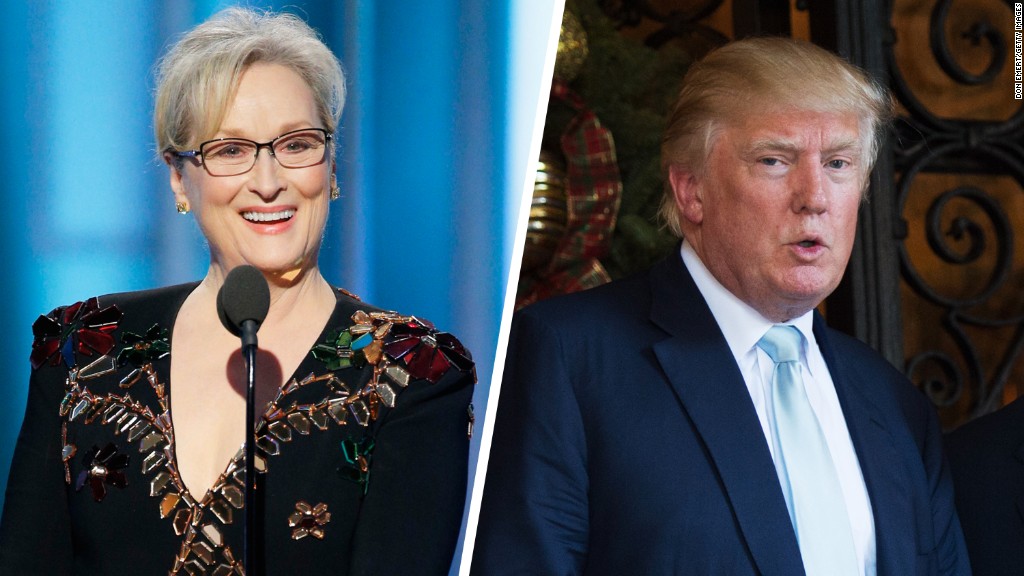
Donald Trump hosted a show called "Celebrity Apprentice." Yet the president-elect and his most fervent supporters tend to dismiss celebrities who dare to criticize him, the latest being Meryl Streep after her politically infused speech during Sunday's Golden Globes.
On Twitter, Trump reacted by calling Streep overrated, and media allies like Sean Hannity quickly weighed in via that medium, labeling Hollywood "a bunch of hypocrites."
There is indeed some hypocrisy at work here. But on this issue it's typically found in the tendency to deride celebrities who politically disagree with you, while heaping praise on those who share your ideology.
Separate from the merits of what they say, you can't swoon over Bruce Springsteen and laugh off Ted Nugent as sources of political wisdom, or vice versa, without betraying bias. Those who told the Dixie Chicks to "shut up and sing," as they famously described it after criticizing George W. Bush, lose credibility when they embrace Jon Voight or Kid Rock.
Republicans booked Scott Baio and Antonio Sabato Jr. for prominent speaking roles at their convention -- a move that Democrats roundly ridiculed, before trotting out their own assortment of higher-wattage stars to perform and speak at their gathering.
Celebrities in various fields -- movies, music, sports -- have a platform to speak out precisely because the media and public give it to them. Such stars are the life's blood of talk shows, where they go to promote their projects, but also to discuss causes that matter to them.
Related: Golden Globes 2017 review: Politics take center stage on 'La La Land's' big night
It's worth noting, too, that the very definition of "celebrity" has evolved and expanded in recent years. Reality television -- the genre that helped define Trump's public profile -- has produced a new strain of people who achieve sudden celebrity or notoriety, some of whom (a la "American Idol's" Clay Aiken, a Democrat, and Sean Duffy, who started out on "Real World" and is now a congressman and member of the Trump transition team) have parlayed that newfound recognition into political runs.
There's no denying that Hollywood's most prominent players gravitate toward progressive causes, and outspoken conservatives are vastly outnumbered. With Democrats as the party out of power, those stars who lean left will be even more prominent among politically-minded celebrities as they become voices of opposition to the new Trump administration -- a trend already witnessed in the run-up to the inauguration.
For some lesser lights, it's impossible to wholly eliminate opportunism from this process. But while studios, networks and sports teams tolerate stars speaking out, these corporate enterprises have little incentive to alienate potential consumers. A franchise like "The Avengers" needs millions of movie-goers to justify Disney's massive investment, which can create unease about director Joss Whedon and his cast seeking to rally Democrats, as they did before the election.
Well-known actors like Streep or Robert De Niro, who have forcefully spoken out against Trump, thus do so out of conviction, not to advance their careers. Professionally speaking, they don't have many mountains left to climb.
And if history's any guide there's also seldom much teeth in threats to boycott talent based on politics. While the 2017 Globes did very well ratings-wise, an overall decline in awards-show tune-in can be traced to a host of factors -- perhaps foremost the sheer glut of such events -- that have nothing to do with complaints about not wanting to be lectured by privileged and pampered actors.
That's not to say those most keenly devoted to politics don't take such factors into account, as is obviously their right. But people and pundits who mock only celebrities who disagree with them for the temerity to publicly expound on matters beyond their direct area of expertise are exposing their partisanship, not their principles.


